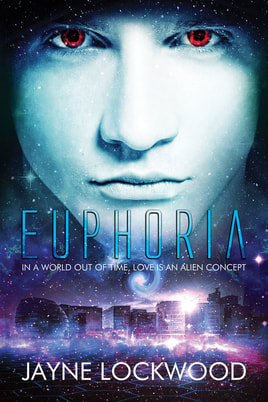
It might take the arrival of an alien being to remind an isolated man what it means to be human.
With a stressful job, his boss breathing down his neck for profitable results, and an estranged wife and daughter, scientist Kurt Lomax doesn’t think life can get much harder. Until a nonbinary extraterrestrial with an otherworldly beauty, captivating elegance, and a wicked sense of humor inconveniently shows up at his apartment.
Vardam watched the destruction of their own world, and they don’t want to see the same thing happen on Earth. They are lonely, and feelings soon develop between them and the supposedly straight scientist—feelings Kurt reciprocates, much to his confusion.
The arrival of cheery interpreter Tom Soames—whose Goth appearance belies a gentle heart—is like a ray of sunshine in the somber lab. He acts as matchmaker for man and tentacled extraterrestrial, unwittingly instigating a national crisis when the news breaks out.
But will a misunderstanding ruin Kurt and Vardam’s chances for happiness together—along with the hope for peace between humanity and the Var?
GENRE: Sci-Fi
MAIN PAIRING: M/Enby
RATING: 3.75 stars
REVIEW
Gosh this was a tricky one to try and rate! Books like this make me wish I'd foregone the concept of stars and ratings altogether here on ceLEStial books, because sometimes you can't really reduce your impressions of a story to a simple number. I went with a 'safe' rating at just under 4 stars, because to me, 4 stars means "I loved it!" and 3 means "This is pretty good." And Euphoria lies somewhere in between.
The classical sci-fi lover in me really appreciated several aspects of Lockwood's story. The concept of time travel to prevent a horrific future for humanity is a trope I've loved since I was a child and first watched the film Twelve Monkeys. I felt somewhat lost in the opening chapter set a hundred years ahead of the bulk of the novel's events, though I could follow enough of what was happening to be hooked into seeing how the time travelling alien's story would progress.
The chapters that followed did an excellent job of exploring the life of a man who has achieved much (but not all) of what he has set out to achieve but, as a result, lost many of the things he'd failed to realise were right in front of him. He's so obsessed with his work that he's lost touch with his family and, whether he intended it or not, become something of a recluse who struggles to connect with others. I personally thought some of these passages were the best in the entire book. The characterisation was at its strongest here! That said, I'm one of those few readers who prefers prose over action and inner-monologue over explosions.
The arrival of Vardam was expertly written. Lockwood's descriptions of Kurt's first impressions of this strange, tentacled (ie. truly alien) creature were believable and fascinating. Given Kurt is a man of science, his mixture of awe, curiosity, and even a degree of stoicism during some moments, seemed completely plausible. The communication issues between them added a culturally intriguing layer to these interactions that I quite enjoyed. It reminded me a little of when the main character in Octavia Butler's Dawn first meets her captors. And given how much I love that book, it's promising that such a comparison struck me as I read Euphoria.
Kurt is one of those characters who carries a lot of emotional baggage because of traumatic events in his past. It's a perfectly good plot device, but I must admit that after a very, very long string of books where the main characters personalities are heavily influenced by sad or traumatic events, I'm ready to read something different. That may well have held me back from 4 stars or higher, which isn't necessarily fair on this novel, but that's why stars/ratings are sometimes a fairly crude instrument in a review. I didn't entirely love his romance with Vardam, something about it felt forced, but I don't read very many books with male protagonists so, again, maybe I need to say: it's not you, Euphoria, it's me.
As the novel continued, I moved back and forth between being completely engrossed, somewhat disconnected, and a little perturbed. I know that MPREG is a popular trope, or perhaps you could even consider it a sort of sub-genre, I honestly don't know, but it's not something I was expecting when I started the book and I'm not entirely sure how I feel about it. I've heard some writers and readers discuss MPREG as a potentially offensive narrative device that fetishises minorities, whilst other articles I've read suggest it's quite a liberating concept that many readers, trans, enby, and cis alike, can engage with and enjoy. The science and reasoning behind this aspect of the novel felt fitting within the book's universe but I don't know enough about this kind of plot development to feel I can make a judgement of any kind. So I'll just point out that it happens, and let others who know what they're talking about delve into the merits of such developments.
The writing itself is pretty darn good. Some descriptions and conversations had me nodding at my Kindle, like, Yep -- nice writtin' there, Jayne. As a fan of sci-fi stories built upon the back of corrupt corporations and explorations of gender, Euphoria had lots to offer me, and I'm glad I read it.
As one final note, I have to say that I adore the cover! The tagline is also so perfect I want to cry with jealousy that I can't come up with something that cool for my own books.
You can buy Euphoria here (publisher) and here (Amazon).


 RSS Feed
RSS Feed

